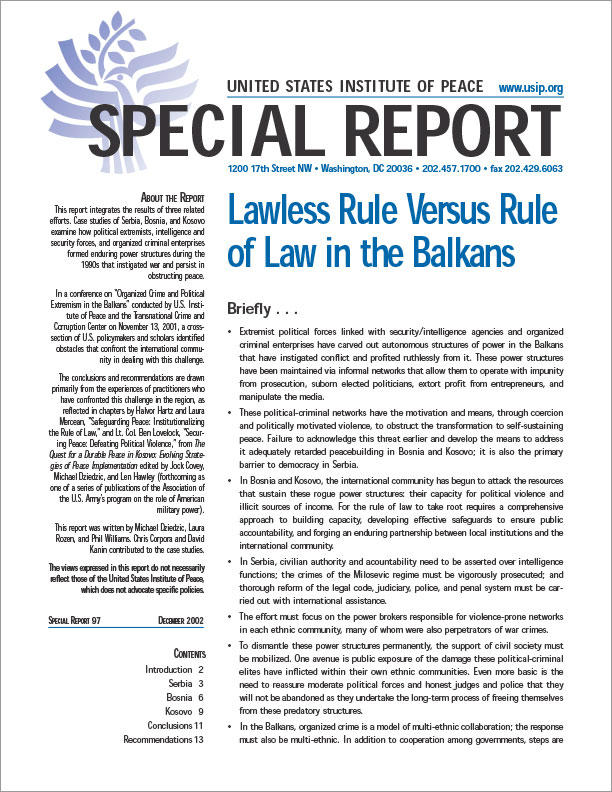This report integrates the results of three related efforts. Case studies of Serbia, Bosnia, and Kosovo examine how political extremists, intelligence and security forces, and organized criminal enterprises formed enduring power structures during the 1990s that instigated war and persist in obstructing peace.

Summary
- Extremist political forces linked with security/intelligence agencies and organized criminal enterprises have carved out autonomous structures of power in the Balkans that have instigated conflict and profited ruthlessly from it. These power structures have been maintained via informal networks that allow them to operate with impunity from prosecution, suborn elected politicians, extort profit from entrepreneurs, and manipulate the media.
- These political-criminal networks have the motivation and means, through coercion and politically motivated violence, to obstruct the transformation to self-sustaining peace. Failure to acknowledge this threat earlier and develop the means to address it adequately retarded peacebuilding in Bosnia and Kosovo; it is also the primary barrier to democracy in Serbia.
- In Bosnia and Kosovo, the international community has begun to attack the resources that sustain these rogue power structures: their capacity for political violence and illicit sources of income. For the rule of law to take root requires a comprehensive approach to building capacity, developing effective safeguards to ensure public accountability, and forging an enduring partnership between local institutions and the international community.
- In Serbia, civilian authority and accountability need to be asserted over intelligence functions; the crimes of the Milosevic regime must be vigorously prosecuted; and thorough reform of the legal code, judiciary, police, and penal system must be carried out with international assistance.
- The effort must focus on the power brokers responsible for violence-prone networks in each ethnic community, many of whom were also perpetrators of war crimes.
- To dismantle these power structures permanently, the support of civil society must be mobilized. One avenue is public exposure of the damage these political-criminal elites have inflicted within their own ethnic communities. Even more basic is the need to reassure moderate political forces and honest judges and police that they will not be abandoned as they undertake the long-term process of freeing themselves from these predatory structures.
- In the Balkans, organized crime is a model of multi-ethnic collaboration; the response must also be multi-ethnic. In addition to cooperation among governments, steps are needed to forge regional and international networks that bring groups from civil society together across ethnic boundaries so they can reinforce each other in addressing this shared problem.
- Unless these predatory power structures are dismantled and the rule of law institutionalized, political extremism and organized crime will continue to fester and destabilize the Balkans.
- The United States should pick its friends with care and make it clear that criminals of all ethnicities should be brought to justice. During the past century, the United States discovered that chronic political unrest in the Balkans could endanger U.S. interests in ways that were impossible to ignore. The likely consequence of future neglect would be for the Balkans to degenerate into a haven or transit point for terrorism.
About the Report
This report integrates the results of three related efforts. Case studies of Serbia, Bosnia, and Kosovo examine how political extremists, intelligence and security forces, and organized criminal enterprises formed enduring power structures during the 1990s that instigated war and persist in obstructing peace.
In a conference on "Organized Crime and Political Extremism in the Balkans" conducted by U.S. Institute of Peace and the Transnational Crime and Corruption Center on November 13, 2001, a cross-section of U.S. policymakers and scholars identified obstacles that confront the international community in dealing with this challenge.
The conclusions and recommendations are drawn primarily from the experiences of practitioners who have confronted this challenge in the region, as reflected in chapters by Halvor Hartz and Laura Mercean, "Safeguarding Peace: Institutionalizing the Rule of Law," and Lt. Col. Ben Lovelock, "Securing Peace: Defeating Political Violence," from The Quest for a Durable Peace in Kosovo: Evolving Strategies of Peace Implementation edited by Jock Covey, Michael Dziedzic, and Len Hawley (forthcoming as one of a series of publications of the Association of the U.S. Army's program on the role of American military power).
This report was written by Michael Dziedzic, Laura Rozen, and Phil Williams. Chris Corpora and David Kanin contributed to the case studies.
The views expressed in this report do not necessarily reflect those of the United States Institute of Peace, which does not advocate specific policies.